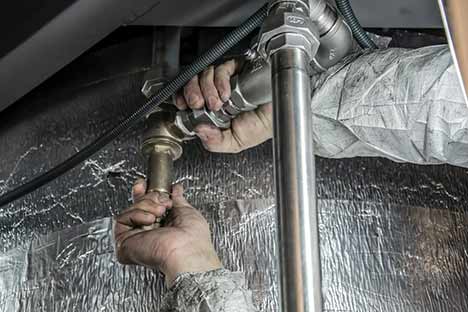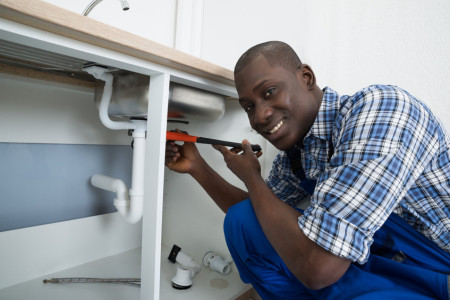Ways to Manage Urgent Plumbing Issues Before Expert Help Arrives
Ways to Manage Urgent Plumbing Issues Before Expert Help Arrives
Blog Article
Listed here in the next paragraphs you might get additional sensible content pertaining to Plumbing Emergencies: Tips on What To Do Before.

Pipes emergencies can strike at any moment, triggering anxiety and prospective damages to your home. Whether it's a ruptured pipeline, a stopped up drainpipe, or a leaking tap, understanding how to manage the circumstance up until a specialist plumbing professional arrives can save you from further problems. This write-up provides important emergency plumbing suggestions to assist you alleviate damages and gain back control throughout a pipes situation.
Switch off the Water
The first step in any type of pipes emergency situation is to turn off the water system. For local problems, such as a leaking faucet or bathroom, turn off the valve near the fixture. In the case of a major leakage or ruptured pipeline, situate your home's major water shut-off shutoff and turn it off right away. Understanding the place of these valves beforehand can save valuable time throughout an emergency situation.
Shut down Your Hot Water Heater
In certain emergency situations, such as a ruptured pipeline, it's smart to shut off your hot water heater. This stops overheating or damages to the system when water stops moving. Shut off the power supply to the water heater (electrical or gas) and let it cool to prevent potential threats.
Briefly Stop a Ruptured Pipe
A ruptured pipe can lead to substantial water damage in mins. To reduce the issue:
Call a professional plumbing professional instantly to resolve the trouble permanently.
Have an Emergency Situation Plumbing Package
Prepare a basic pipes emergency set to handle minor concerns efficiently. Your set needs to include:
Having these tools accessible can make a significant distinction in your capability to take care of emergencies.
Unclog Drains Pipes Safely.
A clogged up drain can be an irritating and untidy concern. Here's just how to tackle it:.
If these methods don't function, avoid utilizing extreme pressure, as it may intensify the clog.
Manage Overflowing Toilets.
An overflowing bathroom can create immediate mayhem. Below's what you need to do:.
Address Little Leaks with Short-term Repairs.
Little leakages can swiftly come to be considerable issues if left unattended. Utilize these momentary repairs up until professional help arrives:.
While these solutions aren't long-term, they can assist lessen water loss and damage.
Deal With Frozen Pipeline Carefully.
In chillier climates, icy pipelines are a typical emergency. If you believe an icy pipe:.
Know When to Call a Professional.
While quick fixes can assist temporarily, specific pipes problems require instant professional focus. Call a plumbing if:.
Without delay getting in touch with a specialist guarantees the concern is dealt with appropriately and prevents additional difficulties.
Avoid More Damage.
Taking quick activity to minimize damages can conserve you time and money over time. Below's how:.
Conclusion.
Plumbing emergencies can be frustrating, yet with the right understanding and devices, you can take care of the situation effectively up until assistance gets here. By switching off the water supply, dealing with little leakages, and making use of temporary fixes, you can reduce damage and maintain your home safe. Bear in mind, these pointers are short-lived solutions; constantly get in touch with a licensed plumbing to deal with the root cause of the problem. Preparation and quick thinking are your finest allies in any plumbing emergency.
8 Helpful Tips for Managing Plumbing Emergencies at Home
If your plumbing system hasn’t failed once, wait for it because almost everyone has a story to tell. Sometimes, it could be simple emergencies such as a leaking pipe, a blocked cistern, or even a big burst pipe. In situations like this, you need to have some handy tips to save you some money and from possible damages.
Take care of minor issues early.
Sometimes, you could have avoided an emergency by taking proactive measures while it was still early. Some major plumbing emergencies can be a result of an ignored minor issue. We recommend that you have items like plumbing tapes and other related items. A plumbing tape can allow you to manage minor leaks before the plumber arrives.
Cut off the water supply.
This tip is essential in almost any type of leakage problem. For problems like minor leakages in the toilet or kitchen, turn off the supply that takes water to the affected pipes. If the leakage is a major pipe, you must shut off the supply valve to the entire building. This will help you avoid flooding your home and neighbors if you share a flat.
Know your plumbing system
Folks typically move into a new apartment without understanding the water supply around the building. This can prove disastrous if a water emergency arises and the plumber is far away. The previous tip will prove useless if you don’t practice this one. More importantly, know where your water shut-off valve is located – you’ll need that knowledge to prevent potential home floods.
Have some common handy tools
There are lots of plumbing emergencies that you can handle without hiring a plumber. That’s why you must keep some tools available always. Some tools that you can use to fix simple plumbing emergencies easily include plumbing tapes, screwdrivers, thread seal tapes, plungers, pliers, tape measures, and rubber gloves.
Insulate your pipes from cold
You’ll save yourself from many plumbing expenses if you protect your water pipes from the cold. This is because of the harmful effects that cold weather can have on your pipes. During winter, your pipes can burst from being overly expected to freezing temperatures. So, make sure insulators are there to keep the pipes working correctly.
Avoid practices that will clog your toilet.
Many people indulge in practices that can damage the plumbing system of the entire building. One of these is when they use their toilet to dispose-off garbage. They flush all kinds of things, such as paper towels, bandages, hairs, female sanitary products, etc., down the toilet. This will block your toilet in the long run, incurring unnecessary expenditures. Dump such waste in the trash instead.
Check your dials regularly.
Sometimes, there could be leakages in your home without noticing them in time. So, constantly monitor your water meter dial. If the dial is reading when there is nobody using water, this is an indicator that there is leaking. Check for leaks immediately. Call a plumber as soon as possible if you can’t find any.
https://www.constructionplacements.com/8-helpful-tips-for-managing-plumbing-emergencies-at-home/

As a devoted reader on Expert Tips for Emergency Plumbing Repairs, I assumed sharing that piece of content was a good idea. Do you know anybody else who is fascinated by What to Do During a Plumbing Emergency? Do not hesitate to promote it. We enjoy your readership.
Click Here Report this page